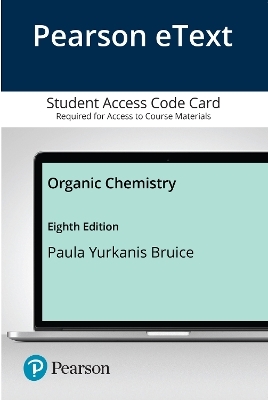
Organic Chemistry
Pearson (Hersteller)
978-0-13-521370-4 (ISBN)
- Titel z.Zt. nicht lieferbar
- Versandkostenfrei innerhalb Deutschlands
- Auch auf Rechnung
- Verfügbarkeit in der Filiale vor Ort prüfen
- Artikel merken
Pearson eText is an easy-to-use digital textbook that you can purchase on your own or instructors can assign for their course. The mobile app lets you keep on learning, no matter where your day takes you -- even offline. You can also add highlights, bookmarks, and notes in your Pearson eText to study how you like.
NOTE: This ISBN is for the Pearson eText access card. Pearson eText is a fully digital delivery of Pearson content. Before purchasing, check that you have the correct ISBN. To register for and use Pearson eText, you may also need a course invite link, which your instructor will provide. Follow the instructions provided on the access card to learn more.
About our author After graduating from the Girls’ Latin School in Boston, Paula Bruice earned an A.B. from Mount Holyoke College and a Ph.D. in chemistry from the University of Virginia. She then received an NIH postdoctoral fellowship for study in the Department of Biochemistry at the University of Virginia Medical School and held a postdoctoral appointment in the Department of Pharmacology at Yale Medical School. Paula has been a member of the faculty at the University of California, Santa Barbara since 1972, where she has received the Associated Students Teacher of the Year Award, the Academic Senate Distinguished Teaching Award, two Mortar Board Professor of the Year Awards, and the UCSB Alumni Association Teaching Award.
PART ONE: An Introduction to the Study of Organic Chemistry
1. Remembering General Chemistry: Electronic Structure and Bonding
2. Acids and Bases: Central to Understanding Organic Chemistry
TUTORIAL: Acids and Bases
3. An Introduction to Organic Compounds: Nomenclature, Physical Properties, and Structure
PART TWO: Electrophilic Addition Reactions, Stereochemistry, and Electron Delocalization
TUTORIAL: Using Molecular Models
4. Isomers: The Arrangement of Atoms in Space
TUTORIAL: Interconverting Structural Representations
5. Alkenes: Structure, Nomenclature, and an Introduction to Reactivity • Thermodynamics and Kinetics
TUTORIAL: Drawing Curved Arrows
6. The Reactions of Alkenes • The Stereochemistry of Addition Reactions
7. The Reactions of Alkynes • An Introduction to Multistep Synthesis
8. Delocalized Electrons: Their Effect on Stability, pKa, and the Products of a Reaction • Aromaticity and Electronic Effects: An Introduction the Reactions of Benzene
TUTORIAL: Drawing Resonance Contributors
PART THREE: Substitution and Elimination Reactions
9. Substitution and Elimination Reactions of Alkyl Halides
10. Reactions of Alcohols, Ethers, Epoxides, Amines, and Sulfur-Containing Compounds
11. Organometallic Compounds
12. Radicals
TUTORIAL: Drawing Curved Arrows in Radical Systems
PART FOUR: Identification of Organic Compounds
13. Mass Spectrometry; Infrared Spectroscopy; and UV/Vis Spectroscopy
14. NMR Spectroscopy
PART FIVE: Carbonyl Compounds
15. Reactions of Carboxylic Acids and Carboxylic Acid Derivatives
16. Reactions of Aldehydes and Ketones • More Reactions of Carboxylic Acid Derivatives
17. Reactions at the α-Carbon
TUTORIAL: Synthesis and Retrosynthetic Analysis
PART SIX: Aromatic Compounds
18. Reactions of Benzene And Substituted Benzenes
19. More About Amines • Reactions of Heterocyclic Compounds
PART SEVEN: Bioorganic Compounds
20. The Organic Chemistry Of Carbohydrates
21. Amino Acids, Peptides, and Proteins
22. Catalysis in Organic Reactions and in Enzymatic Reactions
23. The Organic Chemistry of the Coenzymes, Compounds Derived from Vitamins
24. The Organic Chemistry of the Metabolic Pathways
25. The Organic Chemistry of Lipids
26. The Chemistry of the Nucleic Acids
PART EIGHT: Special Topics in Organic Chemistry
27. Synthetic Polymers
28. Pericyclic Reactions
Appendix I pKa Values
Appendix II Kinetics
Appendix III Summary of Methods Used to Synthesize a Particular Functional Group
Appendix IV Summary of Methods Employed to Form Carbon-Carbon Bonds
Appendix V Spectroscopy Tables
Appendix VI Physical Properties of Organic Compounds
Appendix VII Answers to Selected Problems
| Erscheint lt. Verlag | 8.8.2018 |
|---|---|
| Sprache | englisch |
| Maße | 202 x 251 mm |
| Gewicht | 46 g |
| Themenwelt | Naturwissenschaften ► Chemie ► Organische Chemie |
| ISBN-10 | 0-13-521370-3 / 0135213703 |
| ISBN-13 | 978-0-13-521370-4 / 9780135213704 |
| Zustand | Neuware |
| Informationen gemäß Produktsicherheitsverordnung (GPSR) | |
| Haben Sie eine Frage zum Produkt? |